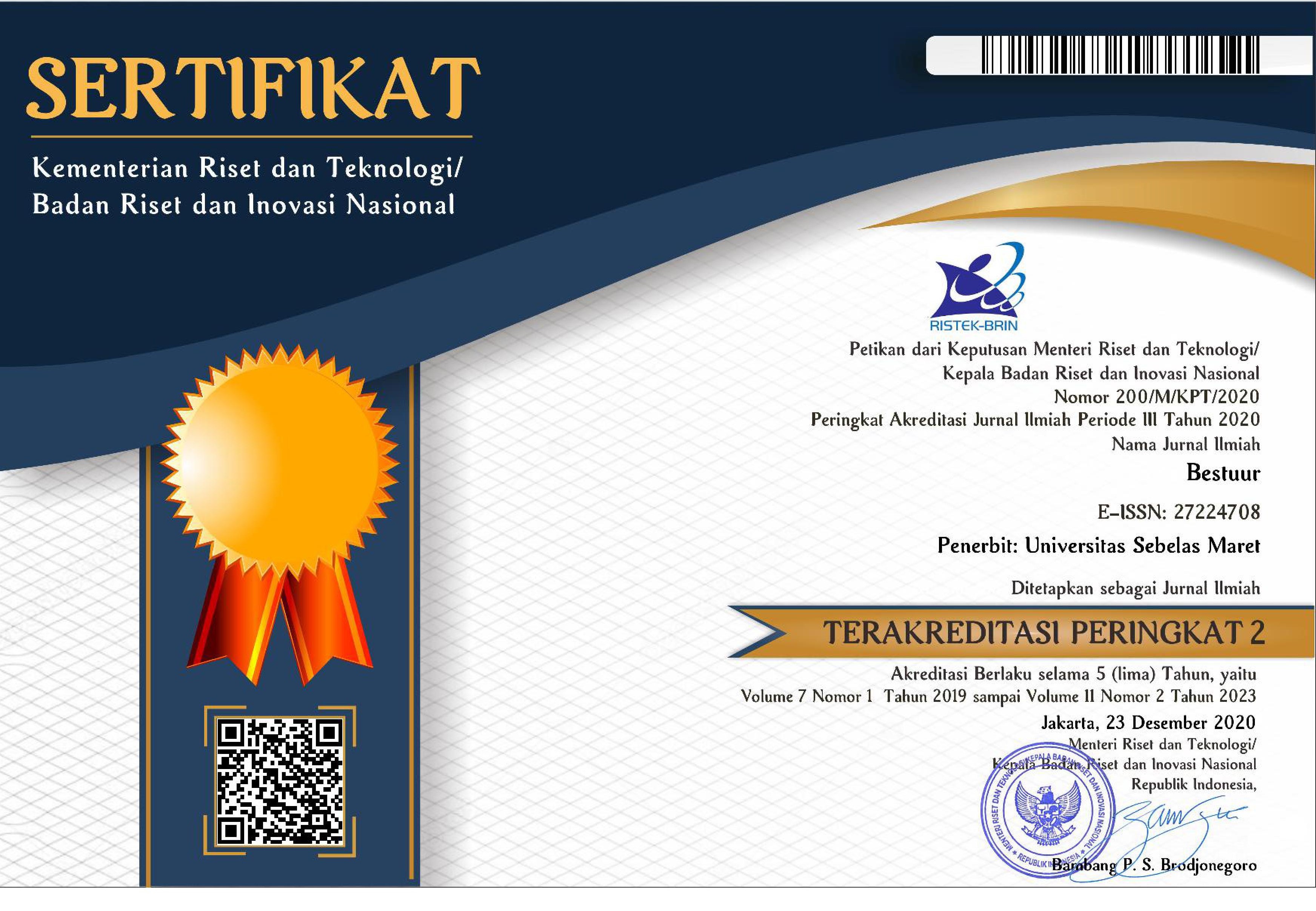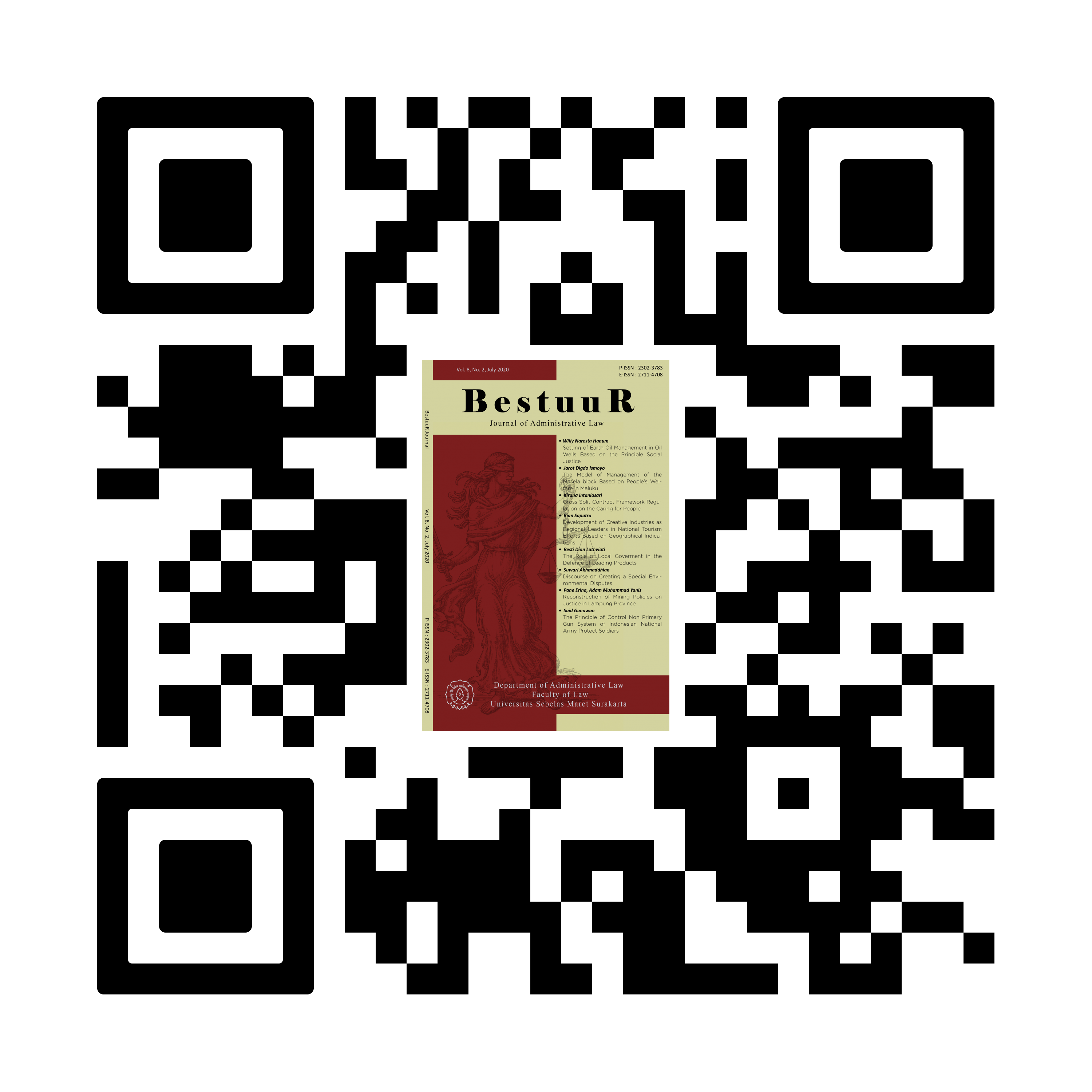Mining Corruption and Environmental Degradation in Indonesia: Critical Legal Issues
Abstract
Indonesia has enacted mining law, environmental protection law, and a number of rules addressing mining and environmental issues. However, the establishment of these numerous laws and regulations has not resulted in a decline in corruption cases and environmental degradation. In fact, government officials are frequently lenient with mining industry owners who fail to follow good environmental standards. This is critical since Indonesia has spent the last two decades attempting to resolve corruption and environmental challenges. This study describes specific instances of mining and environmental law confusion resulting from corrupt activities. The study takes a normative legal approach. Resources have been gathered through examinations of mining and environmental laws and regulations, as well as reports by multiple authorities that track the same subject. The study demonstrates how prior Indonesian mining law policy acknowledged regional governments as mining authorities. The policy has caused widespread mining corruption, particularly in the area of business permits, involving regional political leaders and the private sector. The irresponsibility of regional political elites has jeopardized the environment and ecosystem. It is also an echo of overlapping legislation and authorities in the mining and environmental sectors.
Keywords
Full Text:
PDFReferences
Agarwal, S., Qian, W., Seru, A., & Zhang, J. (2020). Disguised corruption: Evidence from consumer credit in China. Journal of Financial Economics, 137(2), 430–450. https://doi.org/10.1016/j.jfineco.2020.03.002
Ahmed, W. M. A. (2020). Corruption and equity market performance: International comparative evidence. Pacific-Basin Finance Journal, 60, 101282. https://doi.org/10.1016/j.pacfin.2020.101282
Alfada, A. (2019). The destructive effect of corruption on economic growth in Indonesia: A threshold model. Heliyon, 5(10), e02649. https://doi.org/10.1016/j.heliyon.2019.e02649
Appleby, T., Studley, M., Moorhouse, B., Brown, J., Staddon, C., & Bean, E. (2021). Sea of possibilities: Old and new uses of remote sensing data for the enforcement of the Ascension Island marine protected area. Marine Policy, 127, 103184. https://doi.org/10.1016/j.marpol.2018.06.012
Duerrenberger, N., & Warning, S. (2018). Corruption and education in developing countries: The role of public vs. private funding of higher education. International Journal of Educational Development, 62, 217–225. https://doi.org/10.1016/j.ijedudev.2018.05.002
Hamidi, J. (2015). Management of mining in Indonesia: Decentralization and corruption eradication. Management, 44. Google Scholar
Husin, S., & Tegnan, H. (2017). Corruption eradication within the protection of the environment in Indonesia. Asian Journal of Water, Environment and Pollution, 14(4), 99–108. https://doi.org/10.3233/AJW-170040
Irsan, I., & Utama, M. (2019). The political law on coal mining in the fulfilment of people’s welfare in Indonesia. Sriwijaya Law Review, 3(1), 11. https://doi.org/10.28946/slrev.Vol3.Iss1.202.pp11-25
Isra, S., Yuliandri, Amsari, F., & Tegnan, H. (2017). Obstruction of justice in the effort to eradicate corruption in Indonesia. International Journal of Law, Crime and Justice, 51, 72–83. https://doi.org/10.1016/j.ijlcj.2017.07.001
Lukito, A. S. (2016). Building anti-corruption compliance through national integrity system in Indonesia. Journal of Financial Crime, 23(4), 932–947. https://doi.org/10.1108/JFC-09-2015-0054
Marshall, I. E. (2001). A survey of corruption issues in the mining and mineral sector. International Institute for Environment and Development, 15, 3–52. Google Scholar
Moisé, G. M. (2020). Corruption in the oil sector: A systematic review and critique of the literature. The Extractive Industries and Society, 7(1), 217–236. https://doi.org/10.1016/j.exis.2020.01.002
Muslihudin, M., Hendarto, E., Rostikawati, R., Windiasih, R., & Wulan, T. R. (2018). Relationship between environmental damage and corruption cases in Indonesia. E3S Web of Conferences, 73, 02011. https://doi.org/10.1051/e3sconf/20187302011
Nguyen, B. N., Boruff, B., & Tonts, M. (2021). Looking through a crystal ball: Understanding the future of Vietnam’s minerals and mining industry. The Extractive Industries and Society, 8(3), 100907. https://doi.org/10.1016/j.exis.2021.100907
OCallaghan, T. (2010). Patience is a virtue: Problems of regulatory governance in the Indonesian mining sector. Resources Policy, 35(3), 218–225. https://doi.org/10.1016/j.resourpol.2010.05.001
Pellegrini, L., & Gerlagh, R. (2006). Corruption, democracy, and environmental policy. The Journal of Environment & Development, 15(3), 332–354. https://doi.org/10.1177/1070496506290960
Petermann, A., Guzmán, J. I., & Tilton, J. E. (2007). Mining and corruption. Resources Policy, 32(3), 91–103. https://doi.org/10.1016/j.resourpol.2007.08.003
Ridzuan, A. R., Sapuan, N. M., Rahman, N. H. A., Borhan, H., & Othman, A. (2019). The impact of corruption on environmental quality in the developing countries of ASEAN–3: The application of the bound test. International Journal of Energy Economics and Policy, 9(6), 469–478. https://doi.org/10.32479/ijeep.8135
Riyadi, B. S., & Mustofa, M. (2020). Corruption culture on managing natural resources: The case political crime “Papa asking stock of PT. Freeport Indonesia.” International Journal of Criminology and Sociology, 9, 26–36. https://doi.org/10.6000/1929-4409.2020.09.04
Sabani, A., Farah, M. H., & Sari Dewi, D. R. (2019). Indonesia in the spotlight: Combating corruption through ICT enabled governance. Procedia Computer Science, 161, 324–332. https://doi.org/10.1016/j.procs.2019.11.130
Sovacool, B. K. (2021). Clean, low-carbon but corrupt? Examining corruption risks and solutions for the renewable energy sector in Mexico, Malaysia, Kenya and South Africa. Energy Strategy Reviews, 38, 100723. https://doi.org/10.1016/j.esr.2021.100723
Tegnan, H. (2015). Legal pluralism and land administration in West Sumatra: the implementation of the regulations of both local and nagari governments on communal land tenure. The Journal of Legal Pluralism and Unofficial Law, 47(2), 312–323. https://doi.org/10.1080/07329113.2015.1072386
Umam, A. K., Whitehouse, G., Head, B., & Adil Khan, M. (2020). Addressing Corruption in Post-Soeharto Indonesia: The Role of the Corruption Eradication Commission. Journal of Contemporary Asia, 50(1), 125–143. https://doi.org/10.1080/00472336.2018.1552983
Widojoko, J. D. (2017). 17 - Indonesia’s anticorruption campaign: Civil society versus the political cartel. In M. dela Rama & C. Rowley (Eds.), The Changing Face of Corruption in the Asia Pacific (pp. 253–266). Elsevier. https://doi.org/10.1016/B978-0-08-101109-6.00017-4
Yanuardi, Y., Vijge, M. J., & Biermann, F. (2021). Improving governance quality through global standard setting? Experiences from the Extractive Industries Transparency Initiative in Indonesia. The Extractive Industries and Society, 8(3), 100905. https://doi.org/10.1016/j.exis.2021.100905
Zhang, Y.-J., Jin, Y.-L., Chevallier, J., & Shen, B. (2016). The effect of corruption on carbon dioxide emissions in APEC countries: A panel quantile regression analysis. Technological Forecasting and Social Change, 112, 220–227. https://doi.org/10.1016/j.techfore.2016.05.027
DOI: https://doi.org/10.20961/bestuur.v9i2.55219
Refbacks
- There are currently no refbacks.
Copyright (c) 2021 Hilaire Tegnan, Lego Karjoko, Jaco Barkhuizen, Anis H Bajrektarevic

This work is licensed under a Creative Commons Attribution 4.0 International License.
|











_CROSREF.jpg)




